各种状语从句及练习
语法专题:状语从句(含练习和答案)
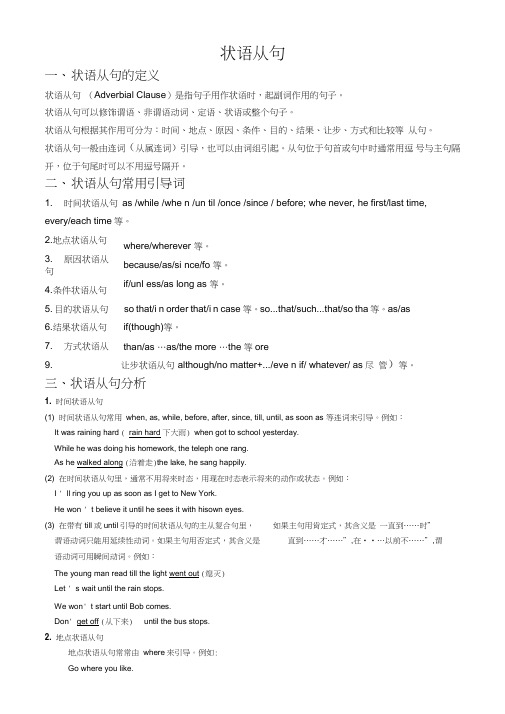
状语从句一、状语从句的定义状语从句(Adverbial Clause)是指句子用作状语时,起副词作用的句子。
状语从句可以修饰谓语、非谓语动词、定语、状语或整个句子。
状语从句根据其作用可分为:时间、地点、原因、条件、目的、结果、让步、方式和比较等从句。
状语从句一般由连词(从属连词)引导,也可以由词组引起。
从句位于句首或句中时通常用逗号与主句隔开,位于句尾时可以不用逗号隔开。
二、状语从句常用引导词1. 时间状语从句as /while /whe n /un til /once /since / before; whe never, he first/last time,every/each time等。
2. 地点状语从句3. 原因状语从句4. 条件状语从句5. 目的状语从句6. 结果状语从句7. 方式状语从句where/wherever 等。
because/as/si nce/fo 等。
if/unl ess/as long as 等。
so that/i n order that/i n case等。
so...that/such...that/so tha等。
as/as if(though)等。
than/as …as/the more …the 等ore9. 让步状语从句although/no matter+.../eve n if/ whatever/ as尽管)等。
三、状语从句分析1. 时间状语从句(1) 时间状语从句常用when, as, while, before, after, since, till, until, as soon as 等连词来引导。
例如:It was raining hard ( rain hard 下大雨) when got to school yesterday.While he was doing his homework, the teleph one rang.As he walked along (沿着走)the lake, he sang happily.(2) 在时间状语从句里,通常不用将来时态,用现在时态表示将来的动作或状态。
状语及状语从句(语法加练习完整讲解)
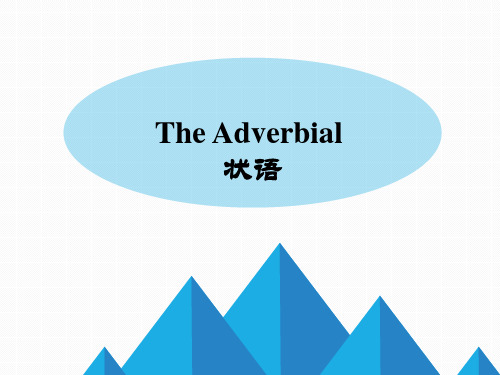
结果状语从句
The problem is so difficult that it will take us time to work it out. 这道题如此难以至于我们要用很多时间才能解决。
She is such a kind girl that everyone likes her. 她非常善良,以至于每个人都喜欢她。
not that...but that...(不是因为...而是因为)
条件状语从句
If you want to succeed, you'd better work hard. 如果你想成功,最好努力工作。 I'll come unless it rains. 除非下雨,否则我一定来。 You can borrow the book as long as you promise to keep i Ming studied so hard that he caught up with the others very quickly. 李明学习如此努力,结果很快赶上了其他人。
6.程度状语: I nearly forgot what he had promised. 我几乎忘记了他答应的事。
(2)如果动词前有一个或几个助动词,状语位于第一个 助动词之后。 He has already had his lunch.他已吃过午饭了。
(3)如果动词是be,状语就放在be动词之后。 He is always at home. 他总是在家。
3.状语位于句末,这是状语的通常位置。
We get up at six in the morning. 我们早晨六点起床。
三、状语的分类:
状语按用途可分为:地点、时间、原因、目的、 结果、条件、让步、程度、方式、伴随情况等几类。
英语状语从句题20套(带答案)含解析

英语状语从句题20套(带答案)含解析一、初中英语状语从句1.You will be late for school________ you don’t get up early.A.but B.if C.and D.or【答案】B【解析】【详解】句意:如果你不早起,你将会上学迟到。
be late for school上学迟到;get up起床。
but表示前后是转折关系;and表示前后并列或递进关系。
由此知前后句构成“结果+条件”的关系,即“如果你不早起,你将会迟到。
”。
故选B。
2.—The novel seems a little boring.—You won’t enjoy it _______________ you put your heart into it.A.when B.if C.after D.unless【答案】D【解析】试题分析:句意:--这部小说似乎有点儿无聊。
--如果你不用心读的话,你不会享受到这本书。
when,当……的时候;if如果;after在……之后;unless,如果不,除非。
结合句意,故选D。
考点:考查连词的用法。
3.We will go to Tian’anmen Square to watch the raising of national flag if it _________ tomorrow.A.will rain B.rainsC.doesn’t rain D.won’t rain【答案】C【解析】试题分析:句意:如果明天不下雨我们要去天安门广场看升国旗。
根据句意及题干分析if 引导的是条件状语从句,主句是一般将来时态,根据“主将从现”原则,if从句中应用一般现在时态,根据句意是“不下雨”,所以选C。
【考点定位】考查动词的时态。
4.—Have you heard of the latest news about WIFI?—Yes. When the 5G age , the Internet speed will be 100 times as high as 4G.A.come B.comes C.will come D.is coming【答案】B【解析】【详解】句意:——你听说过无线网络的最新消息吗?——是的。
状语从句讲解及习题附答案
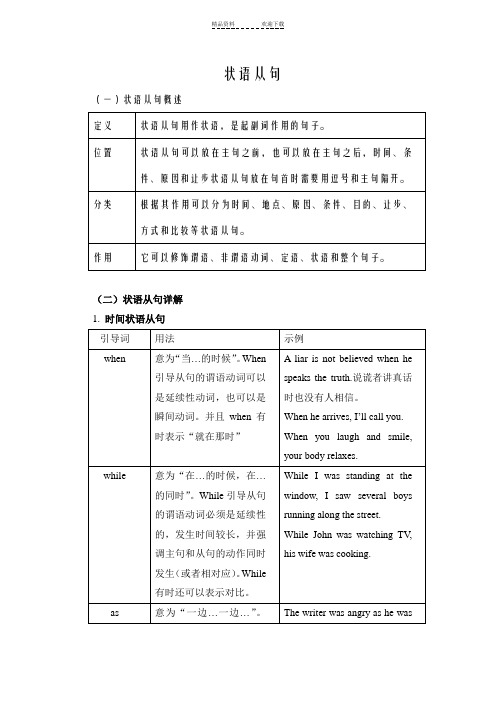
状语从句(一)状语从句概述(二)状语从句详解1. 时间状语从句2.地点状语从句3.条件状语从句4.原因状语从句5.目的状语从句6.结果状语从句7.让步状语从句8. 比较状语从句9.方式状语从句练习一一. 单项填空1. _______ he’s old, he can still carry this heavy bag.A. ThoughB. SinceC. ForD. So2. ---Do you know if he _______ to play basketball with us?---I think he will come if he ______ free tomorrow.A. comes; isB. comes; will beC. will come; isD. will come; will be3. In the zoo if a child _____ into the water and can’t swim, the dolphins may come up ______ him.A. will fall; to helpB. falls; to helpC. will fall; helpD. falls; helping4. I don’t remember ________ he worked in that city when he was young.A. whatB. whichC. whereD. who5. We will stay at home if my aunt ________ to visit us tomorrow.A. comesB. comeC. will comeD. is coming6. The police asked the children _______ cross the street ________ the traffic lights turned green.A. not; beforeB. don’t; whenC. not to; untilD. not; after7. I was late for class yesterday _______ there was something wrong with my bike.A. whenB. thatC. untilD. because8. I’ll go swimming with you if I ________ free tomorrow.A. will beB. shall beC. amD. was9. In the exam, the ________ you are, ______ the _______ mistakes you will make.A. careful; littleB. more careful; fewestC. more careful; fewerD. more careful; less10. You should finish your lessons _______ you go out to play.A. beforeB. afterC. whenD. while11. I hurried _____ I wouldn’t be late for class.A. sinceB. so thatC. as ifD. unless12. When you read the book, you’d better make a mark _______ you have any questions.A. whichB. thatC. whereD. though13. The teacher raised his voice _______ all the students could hear him.A. forB. so thatC. becauseD. in order14. He took off his coat _______ he felt hot.A. becauseB. asC. ifD. since15. It is ______ that we’d like to go out for a walk.A. a lovely dayB. too lovely a dayC. so lovely a dayD. such lovely a day16. Mary had ______ much work to do that she stayed at her office all day.A. suchB. soC. tooD. very17. _______ I felt very tired, I tried to finish the work.A. AlthoughB. BecauseC. AsD. As if18. ______ the day went on, the weather got worse.A. WithB. SinceC. WhileD. As19. ______ well you can drive, you must drive carefully.A. So long asB. In order thatC. No matter howD. The moment20. Write to me as soon as you ________ to Beijing.A. will getB. getC. gettingD. got二. 根据中文意思完成下列英语句子1. 不管他跟我开什么玩笑,我都不生气。
状语从句讲解及练习
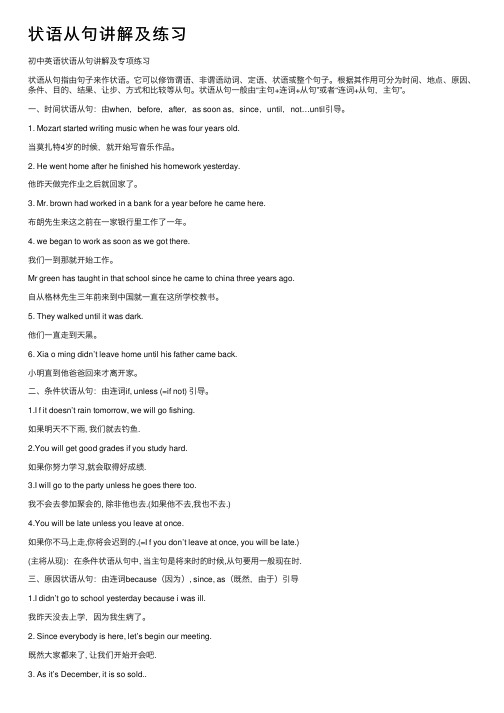
状语从句讲解及练习初中英语状语从句讲解及专项练习状语从句指由句⼦来作状语。
它可以修饰谓语、⾮谓语动词、定语、状语或整个句⼦。
根据其作⽤可分为时间、地点、原因、条件、⽬的、结果、让步、⽅式和⽐较等从句。
状语从句⼀般由“主句+连词+从句”或者“连词+从句,主句”。
⼀、时间状语从句:由when,before,after,as soon as,since,until,not…until引导。
1. Mozart started writing music when he was four years old.当莫扎特4岁的时候,就开始写⾳乐作品。
2. He went home after he finished his homework yesterday.他昨天做完作业之后就回家了。
3. Mr. brown had worked in a bank for a year before he came here.布朗先⽣来这之前在⼀家银⾏⾥⼯作了⼀年。
4. we began to work as soon as we got there.我们⼀到那就开始⼯作。
Mr green has taught in that school since he came to china three years ago.⾃从格林先⽣三年前来到中国就⼀直在这所学校教书。
5. They walked until it was dark.他们⼀直⾛到天⿊。
6. Xia o ming didn’t leave home until his father came back.⼩明直到他爸爸回来才离开家。
⼆、条件状语从句:由连词if, unless (=if not) 引导。
1.I f it doesn’t rain tomorrow, we will go fishing.如果明天不下⾬, 我们就去钓鱼.2.You will get good grades if you study hard.如果你努⼒学习,就会取得好成绩.3.I will go to the party unless he goes there too.我不会去参加聚会的, 除⾮他也去.(如果他不去,我也不去.)4.You will be late unless you leave at once.如果你不马上⾛,你将会迟到的.(=I f you don’t leave at once, you will be late.)(主将从现):在条件状语从句中, 当主句是将来时的时候,从句要⽤⼀般现在时.三、原因状语从句:由连词because(因为), since, as(既然,由于)引导1.I didn’t go to school yesterday because i was ill.我昨天没去上学,因为我⽣病了。
状语从句讲解与练习
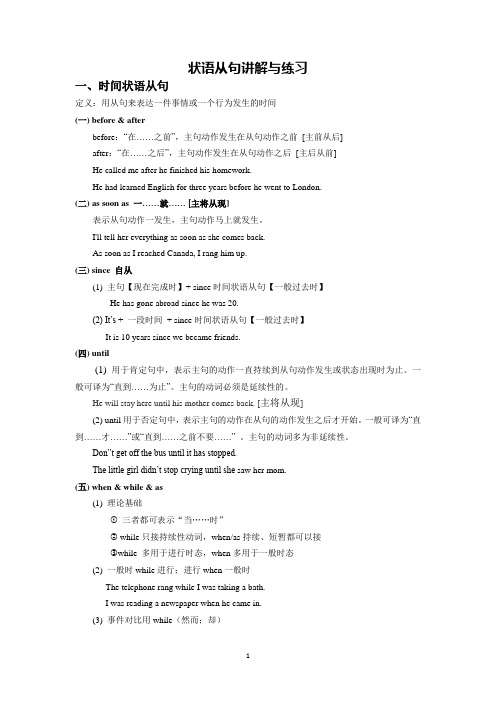
状语从句讲解与练习一、时间状语从句定义:用从句来表达一件事情或一个行为发生的时间(一) before & afterbefore:“在……之前”,主句动作发生在从句动作之前[主前从后]after:“在……之后”,主句动作发生在从句动作之后[主后从前]He called me after he finished his homework.He had learned English for three years before he went to London.(二)as soon as 一……就…… [主将从现]表示从句动作一发生,主句动作马上就发生。
I'll tell her everything as soon as she comes back.As soon as I reached Canada, I rang him up.(三) since 自从(1) 主句【现在完成时】+ since时间状语从句【一般过去时】He has gone abroad since he was 20.(2) It’s + 一段时间+ since时间状语从句【一般过去时】It is 10 years since we became friends.(四) until(1) 用于肯定句中,表示主句的动作一直持续到从句动作发生或状态出现时为止。
一般可译为“直到……为止”。
主句的动词必须是延续性的。
He will stay here until his mother comes back. [主将从现](2) until用于否定句中,表示主句的动作在从句的动作发生之后才开始。
一般可译为“直到……才……”或“直到……之前不要……” 。
主句的动词多为非延续性。
Don”t get off the bus until it has stopped.The little girl didn’t stop crying until she saw her mom.(五) when & while & as(1) 理论基础①三者都可表示“当……时”② while只接持续性动词,when/as持续、短暂都可以接③while 多用于进行时态,when多用于一般时态(2) 一般时while进行;进行when一般时The telephone rang while I was taking a bath.I was reading a newspaper when he came in.(3) 事件对比用while(然而;却)Father was preparing a report while I was playing PC games.He likes coffee while she likes tea.(4) “随着”/“一边…一边”用asThings are getting better and better as time goes on.She sang as she went along.二、原因状语从句because 因为(不与so连用)(1) because &because ofbecause引导原因状语从句because of 是介词短语,后跟n./pron./V-ing,句中作原因状语-- Why didn't he come here?-- He didn’t come here because he was ill.-- He didn’t come here because of his illness.(2) because & for & since & asbecause 语气最强烈;for放句中,用来表示一种附带或补充解释、说明;since & as 通常放句首,作“既然”讲。
【英语】英语状语从句专项训练100(附答案)及解析
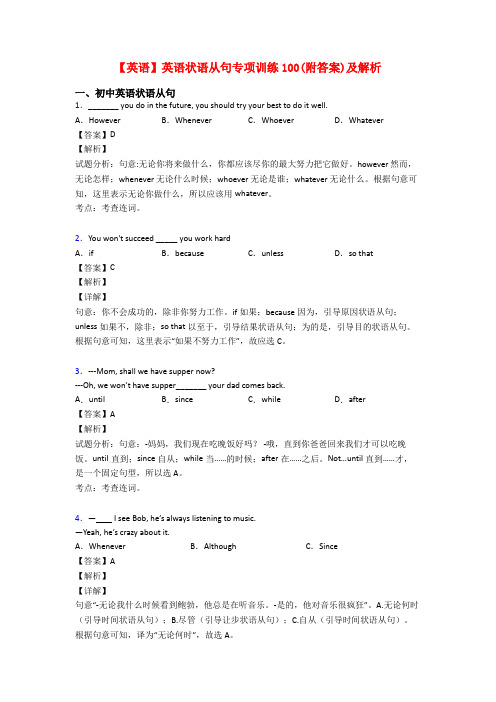
A.unlessB.whenC.ifD.Since
【答案】A
【解析】
【分析】
【详解】
句意:我喜欢新鲜空气,因此我总是让窗户开着,除非真的很冷。考查连词辨析。A.Unless除非,相当于if not,表条件;B.When当……的时候;C.If如果,表条件;D.Since自从。根据I enjoy fresh air so always sleep with the window open可知除非真的很冷否则总是让窗户开着,unless符合题意,故选A。
12._____there was no obvious evidence, most people didn’t think he was guilty of the robbery.
A.WhenB.WhileC.SinceD.As
【答案】C
【解析】
【详解】
句意“由于没有明显的证据,大多数人认为他没有犯抢劫罪”。A.当……时候(引导时间状语从句);B.当……时候(引导时间状语从句);C.since“因为”、“既然”,侧重主句,从句表示显然的或已为人所知的理由,语气比because稍弱;D. as因为,表示的“原因”是双方已知的事实或显而易见的原因,或者理由不是很重要。根据句意可知,因为没有明显的证据,且这个理由很重要,所以人们认为他没有犯抢劫罪,故选C
--- Wonderful. It’s years ____ I enjoyed myself so much.
A.sinceB.afterC.whenD.before
英语状语从句练习题20篇含解析
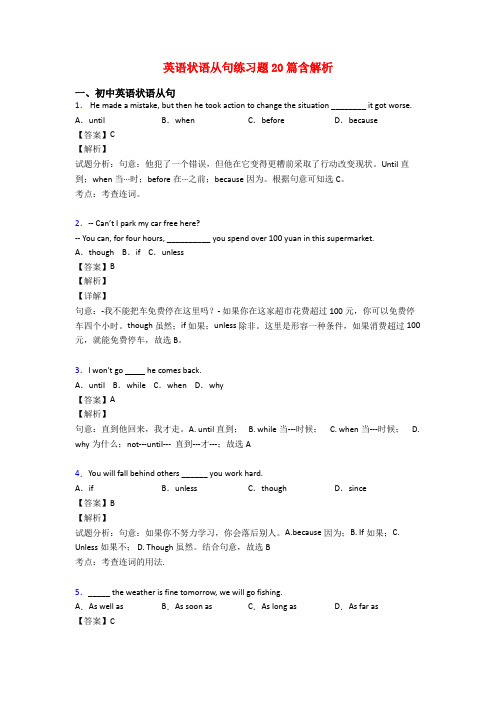
英语状语从句练习题20篇含解析一、初中英语状语从句1. He made a mistake, but then he took action to change the situation ________ it got worse. A.until B.when C.before D.because【答案】C【解析】试题分析:句意:他犯了一个错误,但他在它变得更糟前采取了行动改变现状。
Until直到;when当···时;before在···之前;because因为。
根据句意可知选C。
考点:考查连词。
2.-- Can’t I park my car free here?-- You can, for four hours, __________ you spend over 100 yuan in this supermarket. A.though B.if C.unless【答案】B【解析】【详解】句意:-我不能把车免费停在这里吗?- 如果你在这家超市花费超过100元,你可以免费停车四个小时。
though 虽然;if 如果;unless 除非。
这里是形容一种条件,如果消费超过100元,就能免费停车,故选B。
3.I won't go he comes back.A.until B.while C.when D.why【答案】A【解析】句意:直到他回来,我才走。
A. until 直到; B. while当---时候; C. when当---时候; D. why为什么;not---until--- 直到---才---;故选A4.You will fall behind others ______ you work hard.A.if B.unless C.though D.since【答案】B【解析】试题分析:句意:如果你不努力学习,你会落后别人。
初中英语状语从句练习

初中英语状语从句练习状语从句是英语中用来修饰动词、形容词、副词或整个句子的从句。
它们可以提供时间、地点、原因、条件、让步等信息。
下面是一些练习题,帮助你更好地理解和使用状语从句。
一、时间状语从句1. When you finish your homework, you can go out to play. - 完成作业后,你可以出去玩。
2. As soon as he arrived, he started working.- 他一到达就开始工作。
二、地点状语从句1. Wherever you go, make sure to call your parents.- 不管你去哪里,都要确保给你的父母打电话。
2. I will sit where I can see the stage clearly.- 我会坐在能够清楚看到舞台的地方。
三、原因状语从句1. Because it was raining, the match was postponed.- 因为下雨,比赛被推迟了。
2. Since you are not feeling well, you should rest.- 既然你感觉不舒服,你应该休息。
四、条件状语从句1. If you study hard, you will pass the exam.- 如果你努力学习,你会通过考试。
2. Unless you apologize, I won't forgive you.- 除非你道歉,否则我不会原谅你。
五、让步状语从句1. Although he is old, he is still very active.- 尽管他年纪大了,但他仍然非常活跃。
2. Even though she was tired, she continued working.- 即使她很累,她还是继续工作。
六、结果状语从句1. He ran so fast that he caught the bus.- 他跑得如此快,以至于赶上了公交车。
【语法专项训练】状语从句翻译专项练习及答案
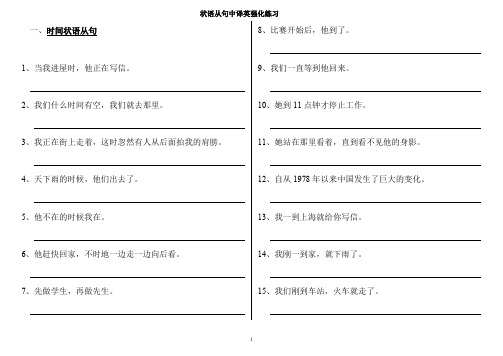
一、时间状语从句1、当我进屋时,他正在写信。
2、我们什么时间有空,我们就去那里。
3、我正在街上走着,这时忽然有人从后面拍我的肩膀。
4、天下雨的时候,他们出去了。
5、他不在的时候我在。
6、他赶快回家,不时地一边走一边向后看。
7、先做学生,再做先生。
8、比赛开始后,他到了。
9、我们一直等到他回来。
10、她到11点钟才停止工作。
11、她站在那里看着,直到看不见他的身影。
12、自从1978年以来中国发生了巨大的变化。
13、我一到上海就给你写信。
14、我刚一到家,就下雨了。
15、我们刚到车站,火车就走了。
16、我们刚开始就被叫停。
17、我每次乘船都晕船。
18、我一听到这首歌,就感到很愉快。
19、下次你来的时候,就会见到他。
二、地点状语从句1、有志者,事竟成。
2、哪里有水,哪里就有生命。
3、你可以随意到你喜欢的任何地方去。
4、无论你去哪都要遵守法律。
三、原因状语从句1、昨天我回来晚了,因为我值班。
2、既然大家都到了,我们开始开会。
3、由于他英语懂得不多,他在字典中查阅这个单词。
4、鉴于天气已经晴朗,我们可以启程了。
5、鉴于他病情严重,我们派人去请医生去了。
四、目的状语从句1、我要把你的电话号码记下来,以免忘记。
2、我把真实情况告诉你,使你能自己作出判断。
3、他们比往常更加努力工作,为了能提前完成工作。
4、多穿点衣服,以免患感冒。
五、结果状语从句1、我们把收音机的音量放大,大家都听到了新闻。
2、他十分激动,以致一句话都说不出来。
3、他说出了这么重要的理由,得到大家的谅解。
4、这是一本十分有意思的书,大家都想看。
六、条件状语从句1、如果我们不怕困难,困难就算不了什么了。
2、除非下雨,我们明天就去那里。
3、只要你努力工作,你就一定能成功。
4、万一我忘了,请提醒我一下。
5、据我所知,那本书下月出版。
七、方式状语从句1、按照我教你的画一只猫。
2、按照人家告诉你做的去做。
3、看上去她好象是生病了。
4、他的行动就好象什么也没有发生。
状语从句专项练习含答案解析
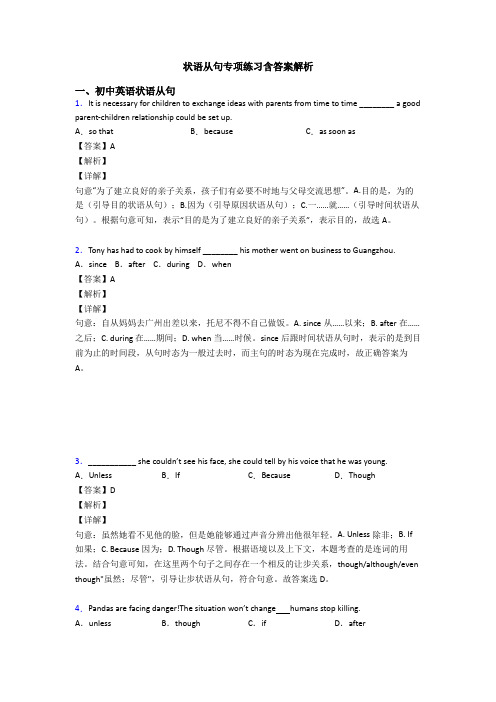
状语从句专项练习含答案解析一、初中英语状语从句1.It is necessary for children to exchange ideas with parents from time to time ________ a good parent-children relationship could be set up.A.so that B.because C.as soon as【答案】A【解析】【详解】句意“为了建立良好的亲子关系,孩子们有必要不时地与父母交流思想”。
A.目的是,为的是(引导目的状语从句);B.因为(引导原因状语从句);C.一……就……(引导时间状语从句)。
根据句意可知,表示“目的是为了建立良好的亲子关系”,表示目的,故选A。
2.Tony has had to cook by himself ________ his mother went on business to Guangzhou. A.since B.after C.during D.when【答案】A【解析】【详解】句意:自从妈妈去广州出差以来,托尼不得不自己做饭。
A. since从……以来;B. after在……之后;C. during 在……期间;D. when当……时候。
since后跟时间状语从句时,表示的是到目前为止的时间段,从句时态为一般过去时,而主句的时态为现在完成时,故正确答案为A。
3.___________ she couldn’t see his face, she could tell by his voice that he was young. A.Unless B.If C.Because D.Though【答案】D【解析】【详解】句意:虽然她看不见他的脸,但是她能够通过声音分辨出他很年轻。
A. Unless除非;B. If 如果;C. Because因为;D. Though尽管。
状语从句详细讲解与练习

2.自从她大学毕业已经有六年时间了。 It has been (is) six years since she graduated from the university.
before,after,since
1. He had left the town the day __b_ef_o_re_ she arrived.
2.将来情况-V一般现在时或现在进行时
e.gI’m going to the post office While you are there。
3.过去情况
e.g. I hurt my shoulder while I was doing gym.
When: 1.当…的时候 When I was young, I went to town myself. When he receives the letter, he’ll tell us.
5. It will not be long b_e_f_or_e_ we meat each other again.
6. It __is_/ _ha_s_b_e_e_n ___ (be) two years since we
b_e_g_a_n___ (begin) to use this machine.
2. It was not long _b_ef_o_re_ he left his hometown.
3. I played football _a_f_te_r_ I (had) finished my homework
4. Please tell her I’ll come __a_f_te_r__ I do some shopping.
attention was caught by a bird.
英语状语从句题20套带答案及解析
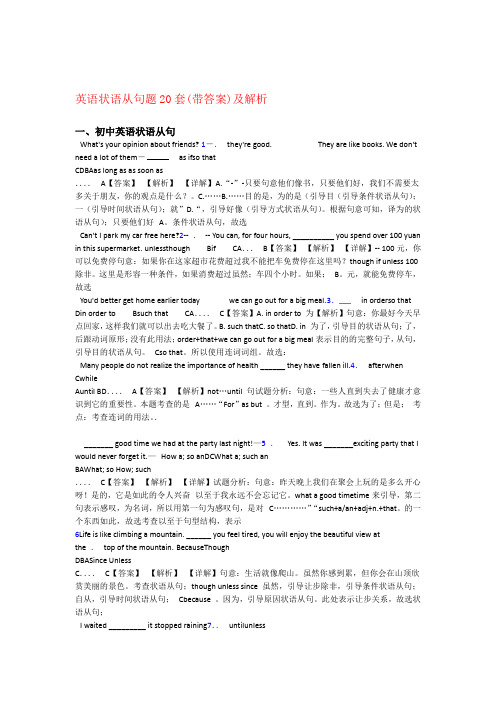
英语状语从句题20套(带答案)及解析一、初中英语状语从句What's your opinion about friends? 1-.they're good. They are like books. We don't need a lot of them-as ifso thatCDBAas long as as soon as....A【答案】【解析】【详解】A.“-”-只要句意他们像书,只要他们好,我们不需要太多关于朋友,你的观点是什么?。
C.……B.……目的是,为的是(引导目(引导条件状语从句);一(引导时间状语从句);就”D.“,引导好像(引导方式状语从句)。
根据句意可知,译为的状语从句);只要他们好A。
条件状语从句,故选Can't I park my car free here?2--.-- You can, for four hours, __________ you spend over 100 yuan in this supermarket.unlessthough Bif CA...B【答案】【解析】【详解】-- 100元,你可以免费停句意:如果你在这家超市花费超过我不能把车免费停在这里吗?though if unless 100除非。
这里是形容一种条件,如果消费超过虽然;车四个小时。
如果;B。
元,就能免费停车,故选You'd better get home earlier today we can go out for a big meal.3.in orderso that Din order to Bsuch that CA....C【答案】A. in order to 为【解析】句意:你最好今天早点回家,这样我们就可以出去吃大餐了。
B. such thatC. so thatD. in 为了,引导目的状语从句;了,后跟动词原形;没有此用法;order+that+we can go out for a big meal表示目的的完整句子,从句,引导目的状语从句。
状语从句及练习附答案

状语从句(adverbial clause)复习要点:掌握句法功能,记住连接词语法意义:状语从句是复合句中的一种,整个从句作主句的状语,修饰主句中的谓语动词、形容词、或副词。
置于句首时,状语从句后面一般要有逗号隔开;如果状语从句置于句尾,则从句一般不用逗号。
按照所作的状语和意义可分为时间、地点、原因、目的、结果、条件、让步、方式和比较等九种状语从句。
具体如下:一、时间状语从句(Adverbial Clauses of Time)时间状语从句通常由when,whenever,as,while,before,after,assoon as,since,once,no sooner...then,hardly/scarcely...when,tiLl/until 以及the moment,directly,immediately,the second,thefirst time,next time,every time,等引导。
1.由when,as,while 引导的状语从句:1)when 引导时间状语从句,表示当···,其谓语动词可以是延续性的,也可以是非延续性的,其作用最广泛。
When spring comes,trees turn green,When it rains,I usually go to work by taxi.When we were having lunch,the light went out.I will ring you up when I return.When she pressed the button,the lift stopped.He was eating his breakfast when the doorbell rang.be about to do...when...“就在那/这时,(突然)另一个动作发生了,在这儿只能用when。
英语状语从句练习题20篇及解析

英语状语从句练习题20篇及解析一、初中英语状语从句1.I didn’t believe I could do it ____ I got to the top of Mount Tai.A.unless B.until C.after D.as【答案】B【解析】试题分析:句意:直到我到达泰山顶上我才相信我能成功。
A. unless如果不,除非,引导条件状语从句;B. until 直到,引导时间状语从句;C. after 在……后,引导时间状语从句;D. as因为,由于,引导原因状语从句。
not …until直到……才,结合句意,故选B。
考点:考查连词的用法。
2.You'd better get home earlier today we can go out for a big meal.A.in order to B.such that C.so that D.in order【答案】C【解析】句意:你最好今天早点回家,这样我们就可以出去吃大餐了。
A. in order to 为了,后跟动词原形;B. such that没有此用法;C. so that为了,引导目的状语从句;D. in order+that+从句,引导目的状语从句。
we can go out for a big meal表示目的的完整句子,所以使用连词词组so that。
故选:C。
3.— _______ good time we had at the party last night!— Yes. It was _______exciting party that I would never forget it.A.What; so B.How; such C.What a; such an D.How a; so an【答案】C【解析】【详解】试题分析:句意:昨天晚上我们在聚会上玩的是多么开心呀!是的,它是如此的令人兴奋以至于我永远不会忘记它。
(完整版)状语从句练习

(完整版)状语从句练习状语从句状语从句:指把一句子当着副词作状语时,修饰动词、或整个句子;根据它在句中的作用可分为时间、地点、原因、条件、目的、结果、让步、方式和比较等从句;状语从句前一般由连词(从属连词)引导,也可以由词组引导。
它常位于句首;若位于句中,常用逗号与主句隔开;位于句尾时可以不用逗号隔开。
一、时间状语从句1. 通常由以下连词弓丨导:when / while / as/ after/ before/ as soon as/ since/ till /until / by the time2. 在时间状语从句中,要注意时态一致。
(主将从现)1).when 当…..的时候: Mozart started writing music when he was four years old.2).while 在…期间: He visited a lot of places while he was traveling.3).as 在…的同时;一边…一边...: He smiled as he stood up.4).after 在...之后: He left the classroom after he had finished his homework the other day.5).before 在...之前Mr. brown had worked in a bank for a year before he came here.6).as soon as 一...就... We bega n to work as soon as we got there. I will write to you as soon as i get home.7).since 自...以来(至U现在) Mr green has taught in that school since he came to china three years ago.8)till /until 直至U : They walked till /until it was dark. Tom didn ' t leave home till / until his father came back.难点---- as/ when/ while的辨析as when while都表示主、从句动作同时发生,三者差异如下:as表示一边…一边"/随着,强调两个动作同时进行,I am cooking as I am singing.when 当…..的时候,从句动作可在主句动作"之前"或"之后"发生lit was raining hard when (as) i got there. 还可表and then; at that moment (正在那个时候/突然):I am leaving for Beijing when the phone rang.while 在…期间从句动作为延续性动词或状态词I am cooki ng while I am si ngi ng然而((表转折,对比)she thought I was talking about her daughter, while I was talking about my daughter.Mother was worried because little Alice was ill, especially as (when/ while) father was away.二、条件状语从句要点:状语从句由连词if (如果)、unless (=if not)(除非)弓I导。
状语从句的用法及练习

状语从句的用法及练习状语从句指句子用作状语时,起副词作用的句子。
它可以修饰谓语、非谓语动词、定语、状语或整个句子。
根据其作用可分为时间、地点、原因、条件、目的、结果、让步、方式和比较等从句。
那么你知道状语从句的用法吗?下面跟着店铺一起来学习一下,希望对大家的学习有所帮助!一、状语从句的用法1、时间状语从句常用引导词:when, as, while, as soon as, while, before, after, since , till, until特殊引导词:the minute, the moment, the second, every time, the day,the instant, immediately , directly, no sooner … than, hardly …when, scarcely … whenI didn't realize how special my mother was until I became an adult.While John was watching TV, his wife was cooking.The children ran away from the orchard(果园) the moment they saw the guard.No sooner had I arrived home than it began to rain.Every time I listen to your advice, I get into trouble.2、地点状语从句常用引导词:where特殊引导词:wherever, anywhere, everywhereGenerally, air will be heavily polluted where there are factories.Wherever you go, you should work hard.3、原因状语从句常用引导词:because, since, as, for特殊引导词:seeing that, now that, in that, considering that,given that, considering that, as much as, so much asMy friends dislike me because I'm handsome and successful.Now that everybody has come, let's begin our conference.The higher income tax is harmful in that it may discourage people from trying to earn more.Considering that he is no more than 12 years old, his height of 1.80 m is quite remarkable.4、目的状语从句常用引导词:so that, in order that特殊引导词:lest, in case, for fear that,in the hope that, for the purpose that, to the end thatThe boss asked the secretary to hurry up with the letters so that he could sign them.The teacher raised his voice on purpose that the students in the back could hear more clearly.5、结果状语从句常用引导词:so that, so… that, such … that,特殊引导词:such that, to the degree that, to the extent that, to such a degree that,He got up so early that he caught the first bus.It's such a good chance that we must not miss it.To such an degree was he excited that he couldn't sleep last night.6、条件状语从句常用引导词:if, unless,特殊引导词:as/so long as, only if, providing/provided that, suppose that, in case that, on condition thatWe'll start our project if the president agrees.You will certainly succeed so long as you keep on trying.Provided that there is no opposition, we shall hold themeeting here.7、让步状语从句常用引导词:though, although, even if, even though特殊引导词: as(用在让步状语从句中必须要倒装),while ( 一般用在句首),no matter …, in spite of the fact that, while, whatever, whoever, wherever, whenever, however, whicheverMuch as I respect him, I can't agree to his proposal.尽管我很尊敬他, 我却不同意他的建议。
状语从句练习(附答案)
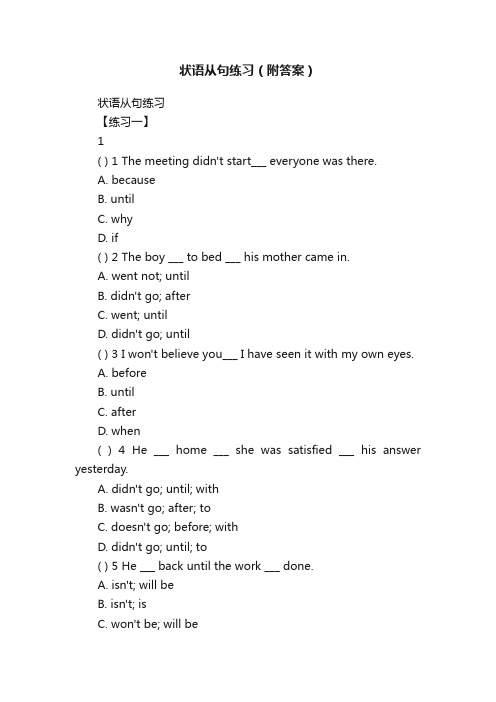
状语从句练习(附答案)状语从句练习【练习一】1( ) 1 The meeting didn't start___ everyone was there.A. becauseB. untilC. whyD. if( ) 2 The boy ___ to bed ___ his mother came in.A. went not; untilB. didn't go; afterC. went; untilD. didn't go; until( ) 3 I won't believe you___ I have seen it with my own eyes.A. beforeB. untilC. afterD. when( ) 4 He ___ home ___ she was satisfied ___ his answer yesterday.A. didn't go; until; withB. wasn't go; after; toC. doesn't go; before; withD. didn't go; until; to( ) 5 He ___ back until the work ___ done.A. isn't; will beB. isn't; isC. won't be; will beD. won't be; is( ) 6 They didn't start the work ___ their teacher came back.A. untilB. whileC. as soon asD. if2( ) 1 Tom will call me as soon as he ___ Shanghai.A. arrivesB. will reachC. arrives inD. get to( ) 2 I'm sure he'll come to see me before he ___ Beijing.A. will leaveB. is leavingC. leaveD. leaves( ) 3 I will tell him the news as soon as he___ back.A. comeB. comesC. will comeD. came3( ) 1 T om has got a watch. He ___ it for two years. It _______ by his father.A. has bought; was boughtB. has got; is bought ,C. was bought; has bought .D. has had; was bought "'( ) 2 When he got to the station, the train ___.A. leftB. had leftC. leavesD. has left( ) 3 The boy told his father what he ___ in the street.A. sawB. have seenC. had seenD. see( ) 4 We ___ TV when the telephone ____.A. watched; was ringingB. were watching; rangC. watch; ringsD. are watching; rang( ) 5 By the end of last term, I___ ten books.A. had finished readingB. have finish readingC. had finish to readD. finish read4( ) 1 I ___ you for a long time. Where ___ you ___?A. didn't see; did; goB. didn't see; have; goneC. haven't seen; have; beenD. haven't seen; have; gone( ) 2 Tom___ China for 3 years.A. has beenB. has been inC. has been toD. has been at( ) 3 I won't go to see the film tonight, because I ___ my ticket.A. lostB. have lostC. will loseD. didn't lose( ) 4 -Hello! May I speak to Bob?A. had been awayB. was leftC. leftD. has been away( ) 5 I ___ him since I began to live in the city.A. knowB. have knownC. knewD. will know( ) 6 Zhao Lan ___ already ___ in this school for two years.A. was; studyingB. will; studyC. has; studiedD. are; studying5( ) 1 Betty didn't go to see the film yesterday ___ she was ill.A. becauseB. butC. untilD. if( ) 2 May I sit nearer___I can see more clearly?A. as ifB. so thatC. even ifD. so( ) 3 ___ you work hard, you will certainly succeed.A. ThoughB. IfC. BecauseD. For( ) 4 ___ he came to study in the university, he has made much progress in the study of English.A. WhileB. WhenC. SinceD. After( ) 5 I'd like to go swimming _____ the water is not too cold.A. forB. unlessC. ifD. whether6( ) 1 There are ___ many league members in class 2 ___ in Class4.A. both; andB. 'so; thatC. either; orD. as; as( ) 2 -Do you have a big library?-No, we don't. At least, not___yours.A. as big asB. as big thanC. as bigger thanD. bigger as( ) 3 Suzhou is not ____ beautiful ____ Hangzhou.A. as; thanB. so; asC. even; thanD. /; than( ) 4 Iron is more useful ___ any other metal.A. asB. thanC. thenD. so7( ) 1 I want to know ___ she is going to see a film.A. ifB. thatC. whatD. which( ) 2 You are sure to pass the exam ___ you study hard.A. ifB. thoughC. thatD. since( ) 3 I'll go to see the film with you___I have time this evening.A. whetherB. soC. ifD. when( ) 4 ___ you study harder, you'll never pass the final exam.A. IfB. UntilC. UnlessD. Except8( ) 1 Although it was raining, ----still worked in the fields.A. but theyB. and theyC. theyD. and yet they( ) 2 ___ there were only five soldiers left at the front, ___ they went on fighting.A. Because; soB. If; andC. Though; butD. Though; /( ) 3 ___ she is very old, ___ she can still work eight hours a day.A. Because; soB. Though; butC. As; yetD. Though; yet9( ) 1 Please answer the question in a loud enough voice ___ all the class may hear.A. so, thatB. orC. in order thatD. and( ) 2 Lift it up___I may see it.( ) 3 I hurried___I wouldn't be late for class.A. soB. so thatC. ifD. unless( ) 4 We should go by bus ___ we can get there earlier.A. as soon asB. whereC. in order thatD. as10( ) 1 The dictionary is so expensive ___ I can't buy it.A. becauseB. whenC. thatD. if( ) 2 I got there ___ late ___ I didn't see him.A. too; toB. such; thatC. so; thatD. so; as( ) 3 It is ___ hot in the room ___ we have to go out for a walk.A. such; thatB. so; thatC. as; asD. such; as( ) 4 He has___ an interesting book that we want to read it.A. soB. suchC. the sameD. as参考答案:1. 1-6 B D B A D A2. 1-3 C D B3. 1-5 D B C B A4. 1-6 C B B D B C5. 1-5 A B B C C6. 1-4 D A B B7. 1-4 A A C C8. 1-3 C D D9. 1-4 C B B C10. 1-4 C C B B【练习二】1. 时间状语从句2. 条件状语从句3. 原因状语从句4. 结果状语从句5. 比较状语从句6. 目的状语从句7. 让步状语从句8. 地点状语从句【名师点睛】:用来修饰主句中的动词,副词和形容词的从句叫状语从句。
- 1、下载文档前请自行甄别文档内容的完整性,平台不提供额外的编辑、内容补充、找答案等附加服务。
- 2、"仅部分预览"的文档,不可在线预览部分如存在完整性等问题,可反馈申请退款(可完整预览的文档不适用该条件!)。
- 3、如文档侵犯您的权益,请联系客服反馈,我们会尽快为您处理(人工客服工作时间:9:00-18:30)。
北京四中从句(二)状语从句状语从句就是一种作状语用得从句,修饰主句中得动词、形容词、副词或修饰全句,补充说明时间、地点、原因、条件、方式、程度、状态等。
㈠时间状语从句:通常用下列从属连词引导:when, while, as, before, after, since(自从…以来), till (until), as soon as(刚一…马上就…), once(一旦), whenever等。
如:①I’ll give the note to him as soon as I see him、我一瞧见她就马上把这条子给她。
②The first bell was already ringing before she got to the school gate、她走到学校大门之前,头遍铃已经响了。
③I’ll go and see her after I get the new dress、我买到新衣服之后要去瞧她。
④I won’t go home until I have finished my homework、我直到做完作业再回家。
⑤As you study a globe, you may notice that most of the large land areas are connected、当您研究地球仪时,您会注意到多数大块陆地就是相连得。
⑥Once he understood, he did what he was told to do、一旦她明白了,她就按照吩咐得去做。
⑦When clothes are washed, they don’t get dry very easily、洗了得衣服不容易干。
⑧He has read a lot since he was a child、她从小时候起已经读了许多书。
⑨I’ll discuss the problem with you whenever you are free、无论您什么时间有空,我就同您讨论这个问题。
◆the moment/ minute/ second, immediately, directly等副词式连词也可引导时间状语从句,意为“一…就…”,相当于as soon as, 此时前面不可再加连词,也不可加at, in, on等介词。
如:①I went home directly I had finished work、我一干完活就回家了。
②Please phone me immediately you get home、您一到家就给我打个电话。
③I loved her the moment I saw her、我一瞧见她就爱上了她。
④I want to see him the minute he arrives、她一来到我就要见她。
* hardly …when…与no sooner…than…得意义相当于as soon as, 也可引起时间状语从句,但只能用过去时,即从句谓语动词用一般过去时,主句谓语动词用过去完成时。
如:①I had hardly fallen asleep when I felt a soft touch on my elbow、= Hardly had I fallen asleep when I felt a soft touch on my elbow、我刚一睡着就觉得有人轻轻碰了碰我得胳膊肘。
②I had no sooner come home than it began to snow、= No sooner had I come home that it began to snow、我刚一到家天就开始下起雪来了。
◆ every time, each time, by the time, soon after, shortly after等表示时间得短语也可作为连词使用,引导时间状语从句,此时前面也常不再加连词。
如:①Each time he comes to Baoding, he comes to see me、每一次她来保定得时候都来瞧我。
②You grow younger every time I see you、我每一次见到您得时候您都显得更年轻。
③Shortly after he took office, the Southern States rebelled、她任职之后不久,南方各州就叛乱了。
④By the time he was fourteen years old, he had taught himself advanced mathematics from textbooks、到十四岁得时候,她已自学了课本上得高等数学。
◆until 与not until:当主句中得动词就是延续性动词时,常用:…until…, 表示主句得动作延续到从句表示得动作发生或完成为止。
如:①Jim stayed up until his mother came back last night、昨晚吉姆一直熬夜到她母亲回来。
②I waited until he had finished his work、我一直等到她做完工作。
当主句中得动词就是非延续性动词时,常用:not…until…, 表示“直到…才…”如:①Jim didn’t go to bed until his mother came back last night、昨晚吉姆直到她母亲回来才睡觉。
②I won’t stop shouting until you let me go、直到您放我走我才停止喊叫。
* not until 置于句首时,主句应用倒装语序。
如:Not until his mother came back did Jim go to bed、吉姆直到她母亲回来才睡觉。
* not until 也可用于强调句型:It is/was not until …that…如:It was not until his mother came back that Jim went to bed、吉姆直到她母亲回来才睡觉。
◆ before从属连词,“在…之前”,但在具体得句子中,译法多种多样。
表示“…才…” “没来得及…就” “…后…才…”如:①He measured me before I could get in a word、没等我插上一句话她就给我量好了尺寸。
②She was angry before I could explain to her、我还没来得及向她解释,她就生气了。
③He asked a second question before I could answer the first question、我还没来得及回答第一个问题,她又问了一个问题。
④I hadn’t waited long before he came、我没等多久她就来了。
⑤We can leave early in the morning before it gets too hot、不等天太热,我们一大清早就出发。
⑥They are thinking of buying the house before the prices go up、她们正在考虑趁房价未涨时把房子买下来。
⑦We walked a whole day before we got to the forest、我们走了一整天才到了森林。
*before 还常用于下列句型:It won’t be …before…用不了(多长时间)就会…It will be…before…得过(多长时间)才…It wasn’t …before…没过(多长时间)就…It was…before…过了(多长时间)才…①It will be a long time before we finish the task、我们还需要很长时间才能完成这项任务。
②It wasn’t long before he learned to use the computer、不久她就学会使用计算机了。
③It was some time before he told me about this affair、过了一段时间之后她告诉了我这件事。
④It won’t be long before we meet again、不久之后我们还会再见面得。
◆ when, while 与as:when 既可引导一持续性动作,又可引导一短暂性动作。
它可以表示主句得动作与从句得动作同时发生,或从句得动作发生在主句动作之前。
如:①When he was a child, he used to play toys、她小时候常玩玩具。
(同时)②When the class was over, we began to clean our classroom、下课后我们开始打扫教室。
(从句动作在前)while 指“在某一段时间里”或“在…期间”,表示时段或过程,强调主句与从句得行为或状态同时发生或存在。
因而while从句必须用延续性动词。
如:①While I was in San Francisco, I met him twice、当我在旧金山时,我见过她两次。
②Please don’t talk so loud while others are working、别人在干活得时候,您们不要大声喧哗。
as 当表示一个人得两个动作交替或同时进行时,多用as,表示“一边…一边…”。
另外,当两个短促行为或事件几乎同时发生时,多用as。
这两种情况一般不用when,更不能用while。
如:①She danced as she sang、她一边唱一边跳。
②Just as he caught the worm, he cried out、她刚抓住那只虫子,就大声叫了出来。
* 当when引导得状语从句就是系表结构(名词作表语),其主语又与主句一致时,往往可用as引导得省略从句代替,应注意as在这里就是连词,不就是介词。
如:When he was a young man, he was a storekeeper and a postmaster、= As a young man, he was a storekeeper and a postmaster、她年轻时开过零售店,后来当过邮政所所长。
* when 除了作从属连词引导时间状语从句,还可作并列连词连接两个并列分句,这样用时,when前可以用逗号,也可不用逗号。
此时,when不译作“当…得时候”,而常常表示“正在…时,这时另一件事发生了”。
其句型有三种形式:be about to do sth、when…正要做某事时突然…be doing sth、when… 正在做某事时突然…had done sth、when…某个动作刚开始或持续没多久,这时另一动作突然发生了如:①I was about to start when the telephone rang、我刚要动身电话就响起来了。
